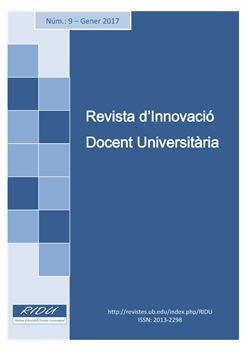The leadership competence in Nursing Studies: a principal components factor analysis
DOI:
https://doi.org/10.1344/RIDU2017.9.11Keywords:
Competences, Leadership, Factor analysis, Nursing studiesAbstract
Jobs are increasingly influenced by the empowerment of competencies allowing organizations to face the challenges and innovative projects presented to them, as well as addressing problem solving in the best possible way. In this sense, one of the competencies that plays a major role is leadership. In this paper, we want to analyse how nursing students at the University of Barcelona perceive and acquire the leadership capacity, since it is fundamental to influence a group and to achieve the required goals. In the specific case of the nursing profession, which is strongly influenced by the organizational changes of the Health Systems, the management of nursing services is considered one of the most relevant aspects in the health organization chart (CODEM, 2016).
The population of study comprised the nursing degree students during the academic year 2012-2013 at the University of Barcelona. The sampling technique selected was a non-probabilistic sampling for convenience, also known as incidental sampling (Buendía, 1994). This technique is chosen given the accessibility and proximity of the sampling subjects (i.e. students attending class on the day the questionnaire was provided).
The questionnaire used in this study consists of 70 questions covering all basic and specific competences acquired in the learning process, as well as the student’s attitude towards the learning process, as it is explained in the Tuning project. Nevertheless, we have adapted it to the nursing degree. Questions are grouped into four blocks. The first corresponds to sociodemographic aspects, the second has to do with the assessment of skills, the third includes the acquisition of transversal competences such as leadership capacity, problem solving ability or teamwork. Finally, the fourth block refers to attitudes when it comes to studying. The variables studied were measured on a Likert scale from 1 to 4, where 4 indicates a high degree of acquisition. The Cronbach's alpha value for questionnaire reliability is 0.925, showing, therefore, high reliability. The number of participants was 171.
In the study we used a multivariate analysis and a multinomial regression to explore the results. The multivariate analysis allows us to reduce the dimensionality of the variables under study. More specifically, the factor analysis using principal components allowed us to identify 4 factors that summarize and group the 20 variables studied; namely (from more to less weight): training for professionalization, self-employment, critical capacity and team decision-making.
Secondly, a Multinomial Regression has been elaborated using the factorial scores to analyse in depth the leadership aspect. In particular, it has been found that all four factors exert a positive influence when moving from a null leadership capacity to a medium capacity, whereas in the transition from a null leadership capacity to a high one only the last three factors seem to have some influence.
References
Alcañiz, M., Claveria, O., Riera-Prunera, C. (2014) Competencias en educación superior desde tres perspectivas diferentes: estudiantes, empleadores y académicos. Revista Iberoamericana de Educación (RIE), 66(2), pp. 1-19.
Alcañiz, M., Riera-Prunera, C., Claveria, O. (2013) La formació competencial dels llicenciats en economia i empresa: una visió des del seu entorn professional. Revista d’Innovació i Recerca en Educació, 6(2), pp. 64-85.
Buendía, L. (1994) Técnicas e instrumentos de recogida de datos. P. Colás y L. Buendía. Investigación educativa (pp. 201.244). Alfar, Sevilla.
CODEM (2016) Estilos de liderazgo en la gestión de Enfermería. Disponible en: http://www.codem.es/investigacion-2/estilos-de-liderazgo-en-gestion-de-enfermeria) (consultado 17 octubre de 2016).
Cortés-González, J., Hernández-Saavedra, M., Marchena-Rivera, T., Marqueti-Machado, M., Nava-Galán, M. (2012) Estilos de liderazgo en jefes de Servicio de Enfermería. Enf Neurol, 12(2), pp. 84-94.
Freire, M.J., Teijeiro ÁLvarez, M.M., Pais Montes, C. (2013) La adecuación entre las competencias adquiridas por los graduados y las requeridas por los empresarios. Revista de Educacion, 362, pp. 13-41.
González, J., Wagenaar, R. (2003) Tuning educational structures in Europe. Disponible en: http://eua.be/eua/jsp/en/upload/TUNING_Announcement_Closing_Conference.1084282515011.pdf (consultado 1 diciembre de 2016).
Hauber, A.B., González, J.M., Groothuis-Oudshoorn, C.G.M., Prior, T., Marshall, D.A., Cunningham, C., IJzerman, M.J. Bridges, J. (2016) Statistical methods for the analysis of discrete-choice experiments: a report of the ISPOR Conjoint Analysis Good Research Practices Task Force. Value in Health, 19(4), pp. 300-315.
Martín Del Peso, M., Rabadán-Gómez, A.B., Hernández-March, J. (2013) Desajustes entre formación y empleo en el ámbito de las enseñanzas técnicas universitarias: La visión de los empleadores de la Comunidad de Madrid. Revista de Educacion, 360, pp. 244-267.
Mason, G., Williams, G., Cranmer, S. (2009) Employability skills initiatives in higher education: what effects do they have on graduate labour market outcomes? Education Economics, 17(1), pp. 1-30.
Moreno-Arroyo, M.C. (2015) Bases para la adquisición de una cultura preventiva ante los riesgos biológicos en los estudiantes de Grado de Enfermería de la Universidad de Barcelona. TDX (Tesis Doctorals en Xarxa). Universitat de Barcelona.
Navarro, M.M., Iglesias, M.P., Torres, P.R. (2006) Las deficiencias formativas en la Educación Superior: El caso de las Ingenierías Educational Gaps in Higher Education : Analysis of the case of the Engineering Careers. Cuadernos de Gestión, 6(1), pp. 27-43.
Paadi, K. (2014) Perception on employability skills necessary to enhance human resource management. Graduates prospects of securing a relevant place in the labour market. European Scientific Journal, Special ed. (August), pp. 129-143.
Teijeiro, M., Rungo, P., Freire, M.J. (2013) Graduate competencies and employability: The impact of matching firms’ needs and personal attainments. Economics of Education Review, 34, pp. 286-295.
UB (2014) Memoria para la verificación del Título de Grado en Enfermería por la Universidad de Barcelona.
Downloads
Published
Issue
Section
License
Authors whishing to publish in this journal agree to the following conditions:
- The author or author retain copyright and grants the journal the right of first publication of the paper.
- The texts will be published under license "Reconocimiento Creative Commons 4.0 España", which allows to share, distribute, reproduce and the public communication of the paper, as long as the name of the author or authors and the journal are clearly stated.







